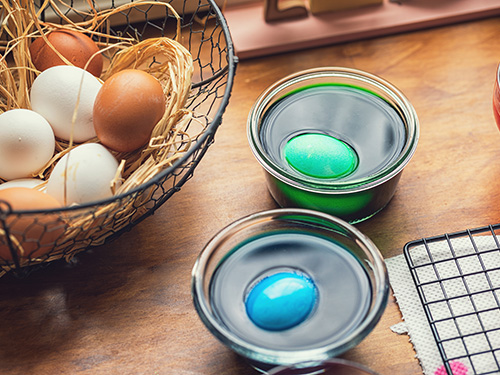A Colorful Easter Basket
Apr 07, 2025

Easter is a time for family fun, festive traditions, and, of course, beautifully decorated eggs! If you raise backyard chickens, you have the unique opportunity to collect eggs in natural shades of blues, greens, browns, and creams — perfect for a colorful Easter basket before you even break out the dye.
Chicken Breeds for a Naturally Colorful Egg Basket
Different chicken breeds lay eggs in a variety of stunning colors, making your Easter egg hunt even more special. Here are a few popular breeds known for their colorful eggs:
Preparing Your Backyard Eggs for Decorating
Once you’ve gathered your colorful eggs, it’s time to prepare them for decorating. There are two primary methods — blowing out the eggs for a long-lasting keepsake or hard-boiling them for a classic Easter tradition.
Blow-Out Method (For Keepsake Eggs)
Hard-Boiling Method (For Classic Easter Eggs)
Whether you’re raising chickens for fresh eggs, a colorful Easter basket, or both, Co-op has everything you need to care for your flock. From quality feed and bedding to coops and accessories, visit your local Co-op to keep your hens happy and healthy all year long.
Wishing you and your flock a Happy Easter! Find the nearest Co-op location here. For more seasonal farm tips, check out the latest issue of The Cooperator.
Chicken Breeds for a Naturally Colorful Egg Basket
Different chicken breeds lay eggs in a variety of stunning colors, making your Easter egg hunt even more special. Here are a few popular breeds known for their colorful eggs:
- Ameraucana and Easter Egger – These friendly hens lay gorgeous blue and green eggs, making them a favorite among backyard chicken owners.
- Marans – If you love deep, rich colors, Marans lay dark brown eggs that can resemble chocolate eggs.
- Olive Egger – A hybrid breed that lays eggs in stunning shades of olive green.
- Welsummer – This breed produces beautiful, speckled terra-cotta eggs, perfect for a rustic Easter display.
- Barred Rock and Rhode Island Red – These classic breeds lay traditional brown eggs, perfect for dyeing and painting.
- Leghorn – While they lay classic white eggs, these eggs are ideal for bright dye colors, giving you a blank canvas to get creative!
Preparing Your Backyard Eggs for Decorating
Once you’ve gathered your colorful eggs, it’s time to prepare them for decorating. There are two primary methods — blowing out the eggs for a long-lasting keepsake or hard-boiling them for a classic Easter tradition.
Blow-Out Method (For Keepsake Eggs)
- Wash and dry the eggs to remove any dirt from the coop.
- Use a large needle to pierce both ends of the egg, carefully wiggling the needle to slightly enlarge the holes.
- Hold the egg over a bowl and blow through one hole to push the egg’s contents out the other end. Save the yolks and whites for cooking!
- Rinse the empty shell and let it dry completely before decorating.
Hard-Boiling Method (For Classic Easter Eggs)
- Store fresh eggs in the refrigerator for a week before boiling to improve peeling.
- Submerge eggs in a saucepan of cold water, ensuring the water covers them by at least an inch. Bring to a boil, then remove from heat and let sit for 10–15 minutes.
- Transfer the eggs to a bowl of cold water to stop the cooking process. Let them cool completely before decorating.
Whether you’re raising chickens for fresh eggs, a colorful Easter basket, or both, Co-op has everything you need to care for your flock. From quality feed and bedding to coops and accessories, visit your local Co-op to keep your hens happy and healthy all year long.
Wishing you and your flock a Happy Easter! Find the nearest Co-op location here. For more seasonal farm tips, check out the latest issue of The Cooperator.